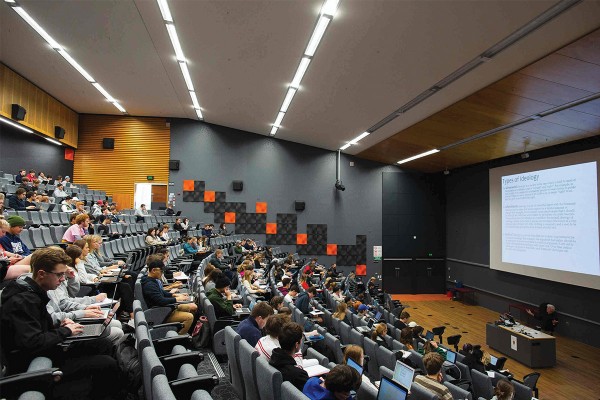Academic Rep Stella Lynch is rolling up her sleeves to advocate for a University of Otago policy that would make recordings with closed captions mandatory for all lectures, with exceptions in cases of privacy concerns. Her plan includes an impending consultation process for staff and students, and is calling on students to engage with an issue which, she anticipates, staff will have a strong opposition to.
Though the University has a lecture recording policy, Stella told Critic that “it’s old and it needs replacing.” Deputy Vice Chancellor Academic Professor Stuart Brock told Critic, “The University does have a lecture recordings policy, however, it was last formally reviewed in 2016. There have been many changes in our context and subsequent teaching and recording practices at the University since this time. As a result, the University is in the early stages of reviewing the policy and has invited OUSA to partner with the Academic Division in the process.”
The current policy details how everything is supposed to run should a lecturer choose to record lectures, however the policy only applies in situations where lecturers choose to have lecture recordings. Alternatively, Stella’s proposed policy advocates for universal access to closed captioned lecture recordings across all subjects.
Stella says that the policy is crucial for accessibility of learning to all students, especially disabled tauira who “even with disability support can still struggle to get access to lecture recordings.” She said that the list of students who’d benefit from the policy extended from neurodivergent students to international students.
“We’ve got students who English isn’t their first language, and so trying to translate in your head or with software in a lecture theatre [...] isn’t viable, so you’ve got to watch it at home. I think anyone else with a job, with childcare, and commitments that can’t make it to uni that day. Everybody has a use for them, and there’s no literature out there that’s saying it’s going to tank our marks. It either doesn’t affect our marks or it brings [students in the middle] up.”
Lecture recordings are often a “hot topic” among uni staff, according to Stella. “One of the big concerns is attendance. And I hate that because attendance and engagement with content are two completely different things. You can’t combine them into one and say, ‘Oh, well students aren’t gonna attend so they’re gonna fail. It’s not how it works. If you did that then I'd be on track to fail, whereas I engage with my content […] half the time I just can’t attend class.”
The other point of concern that’s been raised to Stella by staff are concerns over privacy. These concerns are raised particularly within courses such as Med and Law where patient and client confidentiality become key issues. And these are the real ones, in case studies, not your mate who you’ve roped into acting for a mock appointment or court trial. “Where there is a concern that we can’t mitigate through other parts of the policy, we will write exemptions into the policy. So if there is patient confidentiality, that can’t be recorded [...] we don’t wanna put that in the public domain.”
Last year, Victoria University adopted a policy making it compulsory for staff to record lectures in rooms “with the equipment to do so or provide other appropriate materials to student[s]” as RNZ reported, following a push from the Uni’s student association. Stella said that while the policy she is proposing will be similar in essence, it’ll have “different provisions in place for our staff and students […] especially because we’ve got a health science department and they don’t [...] And so ours will be similar in principle but hopefully better.”
In terms of a timeline for implementing the policy, Stella has a fair bit to go. Last Thursday, she and the DVC Academic presented the current policy to the Committee for the Advancement of Learning and Teaching, asking for their endorsement of their consultation process which will include extensive surveys of both staff and students. Professor Brock said, “I am excited to be working closely with OUSA on this review, ensuring we have a strong student voice throughout the process.”
Stella intends on going ham during Re-O Week to seek student feedback, aiming for 6000 students: “So that’s 30% of the student population which would be massive because [...] staff are gonna be so passionate about it and they’re gonna be really loud about it and we need heaps of students to be equally as loud back – hopefully supporting it, but whatever you wanna say, I want to hear about it.” They’ll be promoting feedback through class reps, hall drop-in sessions, and at Re-Ori events as well.
All things going well for Stella, the policy would be implemented at the beginning of 2026. To students wondering why they should engage with a policy that wouldn’t be put in place until perhaps after they’d graduated, Stella said: “I’m gonna be gone by then, but my little sister’s starting next year, and for her, that’ll be massive [...] It’s so important for everyone whether you’re gonna be here or not.



